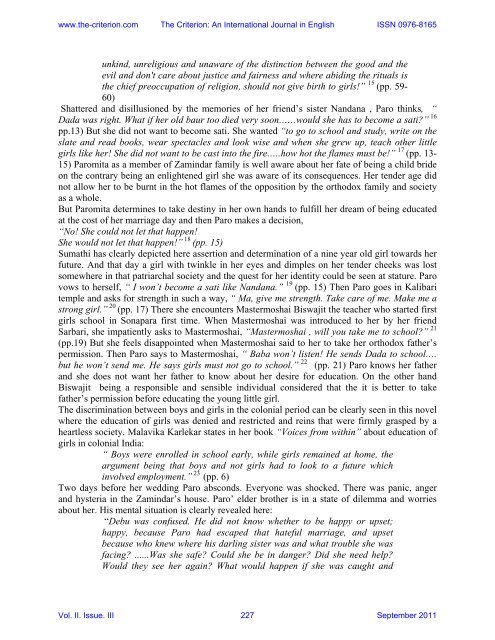Vol. II. Issue. III September 2011 - The Criterion: An International ...
Vol. II. Issue. III September 2011 - The Criterion: An International ...
Vol. II. Issue. III September 2011 - The Criterion: An International ...
You also want an ePaper? Increase the reach of your titles
YUMPU automatically turns print PDFs into web optimized ePapers that Google loves.
www.the-criterion.com <strong>The</strong> <strong>Criterion</strong>: <strong>An</strong> <strong>International</strong> Journal in English ISSN 0976-8165<br />
unkind, unreligious and unaware of the distinction between the good and the<br />
evil and don't care about justice and fairness and where abiding the rituals is<br />
the chief preoccupation of religion, should not give birth to girls!” 15 (pp. 59-<br />
60)<br />
Shattered and disillusioned by the memories of her friend’s sister Nandana , Paro thinks, “<br />
Dada was right. What if her old baur too died very soon……would she has to become a sati?” 16<br />
pp.13) But she did not want to become sati. She wanted “to go to school and study, write on the<br />
slate and read books, wear spectacles and look wise and when she grew up, teach other little<br />
girls like her! She did not want to be cast into the fire…..how hot the flames must be!” 17 (pp. 13-<br />
15) Paromita as a member of Zamindar family is well aware about her fate of being a child bride<br />
on the contrary being an enlightened girl she was aware of its consequences. Her tender age did<br />
not allow her to be burnt in the hot flames of the opposition by the orthodox family and society<br />
as a whole.<br />
But Paromita determines to take destiny in her own hands to fulfill her dream of being educated<br />
at the cost of her marriage day and then Paro makes a decision,<br />
“No! She could not let that happen!<br />
She would not let that happen!” 18 (pp. 15)<br />
Sumathi has clearly depicted here assertion and determination of a nine year old girl towards her<br />
future. <strong>An</strong>d that day a girl with twinkle in her eyes and dimples on her tender cheeks was lost<br />
somewhere in that patriarchal society and the quest for her identity could be seen at stature. Paro<br />
vows to herself, “ I won’t become a sati like Nandana.” 19 (pp. 15) <strong>The</strong>n Paro goes in Kalibari<br />
temple and asks for strength in such a way, “ Ma, give me strength. Take care of me. Make me a<br />
strong girl.” 20 (pp. 17) <strong>The</strong>re she encounters Mastermoshai Biswajit the teacher who started first<br />
girls school in Sonapara first time. When Mastermoshai was introduced to her by her friend<br />
Sarbari, she impatiently asks to Mastermoshai, “Mastermoshai , will you take me to school?” 21<br />
(pp.19) But she feels disappointed when Mastermoshai said to her to take her orthodox father’s<br />
permission. <strong>The</strong>n Paro says to Mastermoshai, “ Baba won’t listen! He sends Dada to school….<br />
but he won’t send me. He says girls must not go to school.” 22 (pp. 21) Paro knows her father<br />
and she does not want her father to know about her desire for education. On the other hand<br />
Biswajit being a responsible and sensible individual considered that the it is better to take<br />
father’s permission before educating the young little girl.<br />
<strong>The</strong> discrimination between boys and girls in the colonial period can be clearly seen in this novel<br />
where the education of girls was denied and restricted and reins that were firmly grasped by a<br />
heartless society. Malavika Karlekar states in her book “Voices from within” about education of<br />
girls in colonial India:<br />
“ Boys were enrolled in school early, while girls remained at home, the<br />
argument being that boys and not girls had to look to a future which<br />
involved employment.” 23 (pp. 6)<br />
Two days before her wedding Paro absconds. Everyone was shocked. <strong>The</strong>re was panic, anger<br />
and hysteria in the Zamindar’s house. Paro’ elder brother is in a state of dilemma and worries<br />
about her. His mental situation is clearly revealed here:<br />
“Debu was confused. He did not know whether to be happy or upset;<br />
happy, because Paro had escaped that hateful marriage, and upset<br />
because who knew where his darling sister was and what trouble she was<br />
facing? ......Was she safe? Could she be in danger? Did she need help?<br />
Would they see her again? What would happen if she was caught and<br />
<strong>Vol</strong>. <strong>II</strong>. <strong>Issue</strong>. <strong>II</strong>I 227 <strong>September</strong> <strong>2011</strong>
















